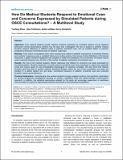How do medical students respond to emotional cues and concerns expressed by simulated patients during OSCE consultations? - A multilevel study
Abstract
Objectives: How medical students handle negative emotions expressed by simulated patients during Objective Structured Clinical Examinations (OSCE) has not been fully investigated. We aim to explore (i) whether medical students respond differently to different types of patients’ emotional cues; and (2) possible effects of patients’ progressive disclosure of emotional cues on students’ responses. Methods: Forty OSCE consultations were video recorded and coded for patients’ expressions of emotional distress and students’ responses using a validated behavioural coding scheme (the Verona Coding Definitions of Emotional Sequence). Logistic multilevel regression was adopted to model the probability of the occurrence of student reduce space response behaviour as a function of the number of patients’ expressions of emotional cues. Results: We found that medical students offered responses that differed to emotional cue types expressed by simulated patients. Students appeared to provide space to emotional cues when expressed in vague and unspecific words and reduce space to cues emphasizing physiological or cognitive correlates. We also found that medical students were less likely to explore patients’ emotional distress nearer the end of the consultation and when the duration of a patient speech turn got larger. Cumulative frequency of patients’ emotional cues also predicted students’ reduce space behaviour. Practical Implications: Understanding how medical students manage negative emotions has significant implications for training programme development focusing on emotion recognition skills and patient-centred communication approach. In addition, the statistical approaches adopted by this study will encourage researchers in healthcare communication to search for appropriate analytical techniques to test theoretical propositions.
Citation
Zhou , Y , Collinson , A , Laidlaw , A H & Humphris , G M 2013 , ' How do medical students respond to emotional cues and concerns expressed by simulated patients during OSCE consultations? - A multilevel study ' , PLoS ONE , vol. 8 , no. 10 , e79166 , pp. 1-9 . https://doi.org/10.1371/journal.pone.0079166
Publication
PLoS ONE
Status
Peer reviewed
ISSN
1932-6203Type
Journal article
Collections
Items in the St Andrews Research Repository are protected by copyright, with all rights reserved, unless otherwise indicated.

